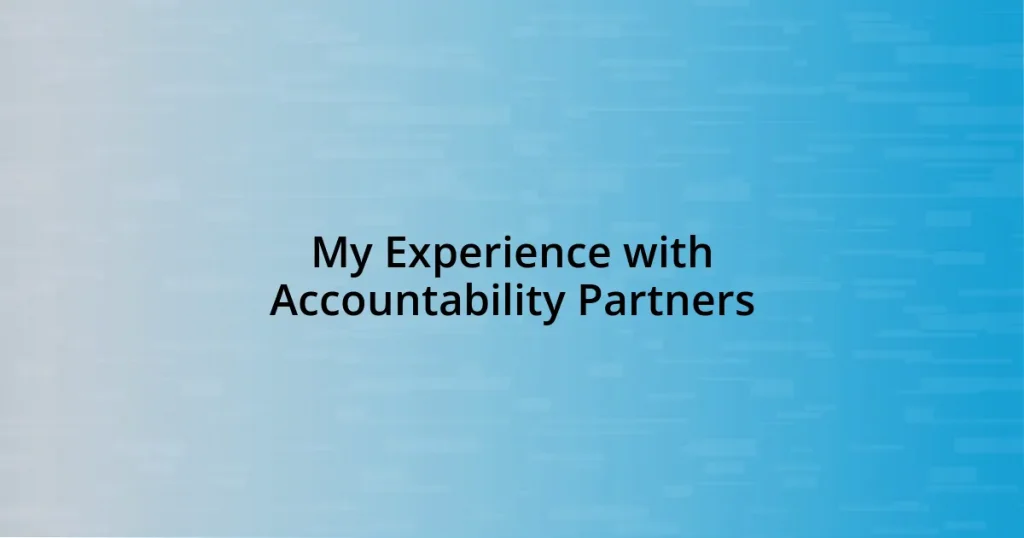Key takeaways:
- Accountability partners enhance motivation by providing support, feedback, and fostering a sense of camaraderie.
- Choosing the right partner involves aligning on goals, trustworthiness, and communication style for effective collaboration.
- Setting clear, specific goals and celebrating small victories strengthens accountability and enhances the partnership experience.
- Open communication and vulnerability are essential for overcoming challenges and maintaining consistency in accountability relationships.
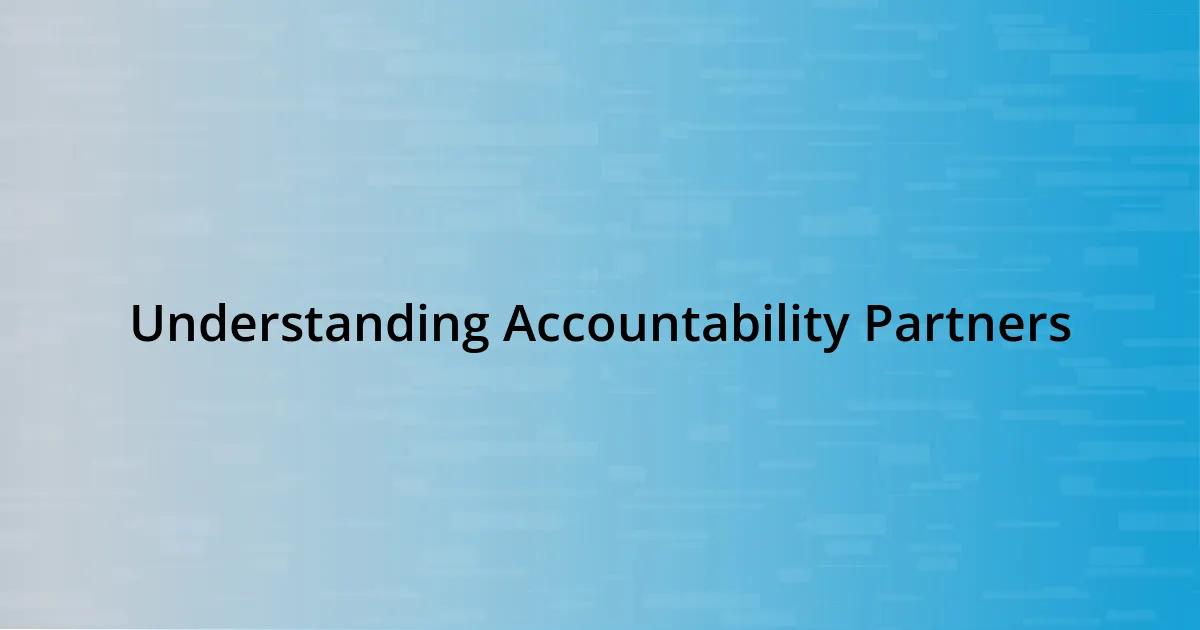
Understanding Accountability Partners
Accountability partners are individuals who support and motivate each other to achieve personal goals. In my experience, it’s like having a workout buddy for your aspirations. When I was working on a big project, my partner would check in regularly, and I found that knowing someone else was invested in my progress pushed me to stay on track.
The dynamic of sharing your goals with another person creates a unique bond. I remember sharing my goals with my accountability partner over coffee, feeling both vulnerable and empowered. Have you ever felt hesitant to share your dreams with others? That moment of taking a leap and sharing can be exhilarating and scary at the same time, but it’s a key step in the process of accountability.
Having an accountability partner also means offering feedback and honest encouragement. I vividly recall a time when I was ready to give up on my ambitions, and my partner reminded me of the progress I’d made. Isn’t it incredible how someone else’s belief in you can reignite your own determination? This two-way street of support not only holds you accountable but can also foster a sense of camaraderie and shared purpose.
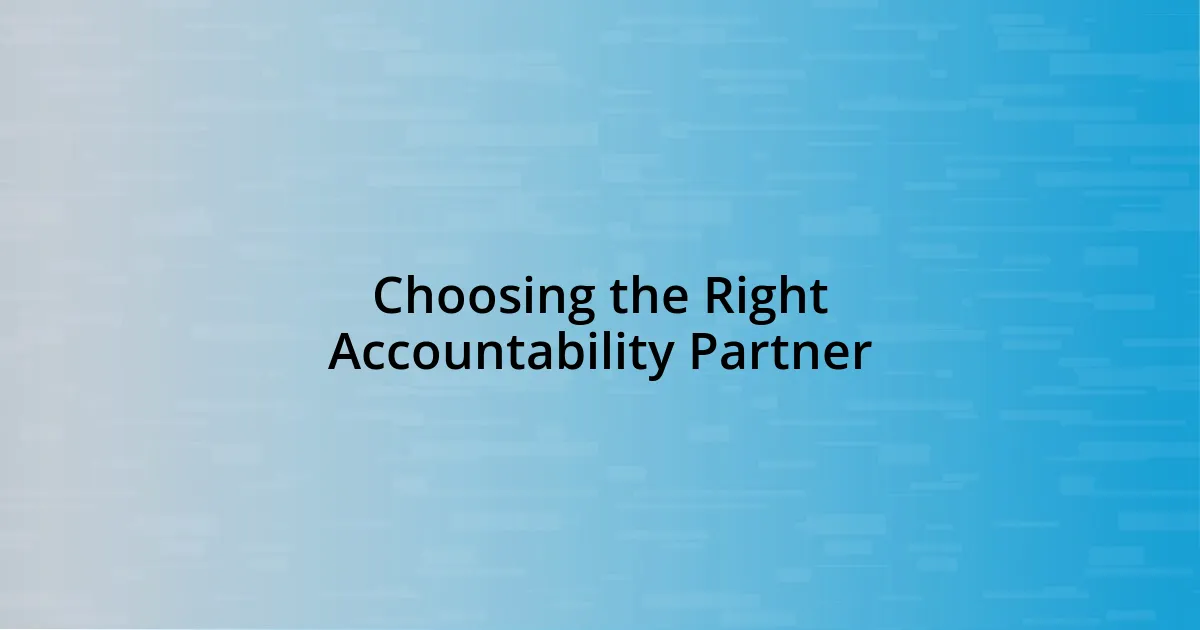
Choosing the Right Accountability Partner
When it comes to choosing the right accountability partner, it’s essential to find someone who shares your goals or values. I once partnered with someone who had a different vision, and while it was initially tempting, I quickly realized that our differences often led to misunderstandings rather than productive discussions. I learned that aligning on both objectives and commitment levels can create a solid foundation for mutual support.
Here are some key factors to consider when selecting your accountability partner:
- Shared Goals: Look for someone whose aspirations resonate with yours, fostering genuine understanding.
- Trustworthiness: You need someone you can be open and honest with about your struggles and successes.
- Reliability: A good partner should be consistently available, ready to check in on your progress.
- Motivational Style: Choose someone whose encouragement matches how you respond best—whether it’s tough love or a softer approach.
- Willingness to Be Vulnerable: Both partners should be comfortable sharing their setbacks and fears to foster deeper connections.
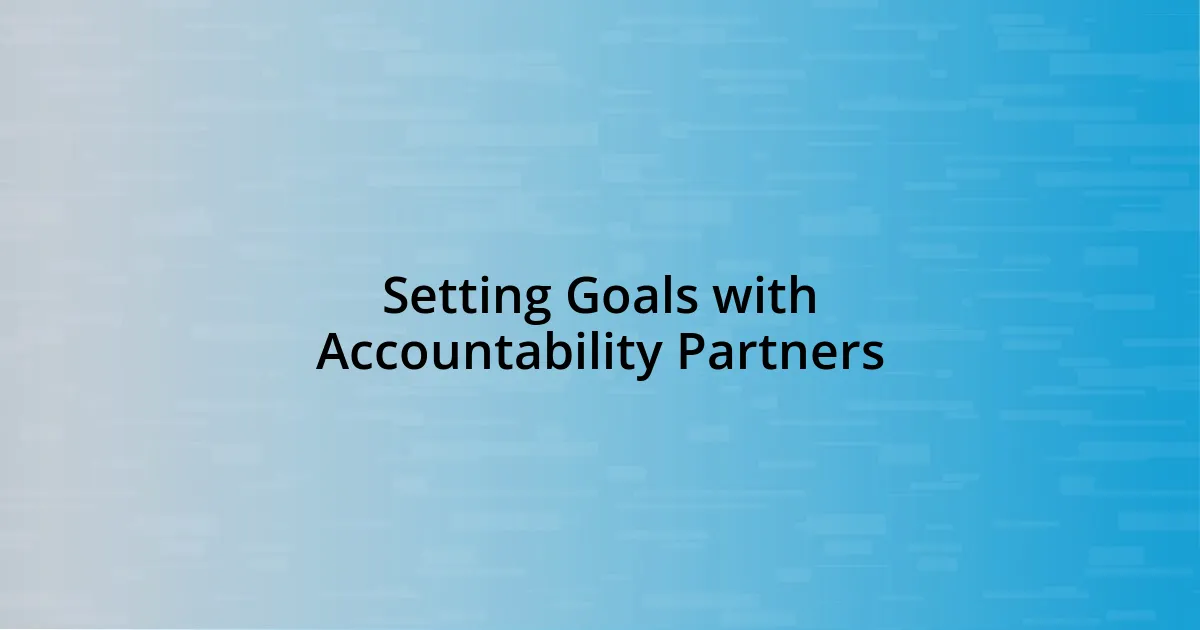
Setting Goals with Accountability Partners
When setting goals with an accountability partner, clarity is vital. I recall a time when my partner and I sat down and articulated our specific goals together. It was enlightening to learn how a few precise words could transform vague aspirations into actionable steps. Have you ever written down your goals only to realize later that you were unsure about their direction? Being explicit about what you want is the first step toward accountability.
It’s also fascinating how having someone to share milestones with can elevate the entire experience. I remember celebrating small victories with my partner, like finally hitting a deadline. Those moments weren’t just about the achievement; they became cherished memories that strengthened our partnership. Don’t you think this shared celebration adds a layer of joy to goal accomplishment that we often overlook?
Additionally, regular check-ins with your accountability partner create a rhythm that fosters commitment. I always looked forward to our scheduled meetings because they instilled a sense of responsibility in me. With someone else expecting updates on my progress, I found myself pushing through obstacles that I might have otherwise shied away from. What about you? Have you experienced that kind of pressure before, and did it motivate you?
| Component | Importance |
|---|---|
| Clarity | Transforming vague goals into specific actions. |
| Celebration of Milestones | Enhances connection and reinforces motivation. |
| Regular Check-ins | Creates accountability and establishes a productive routine. |
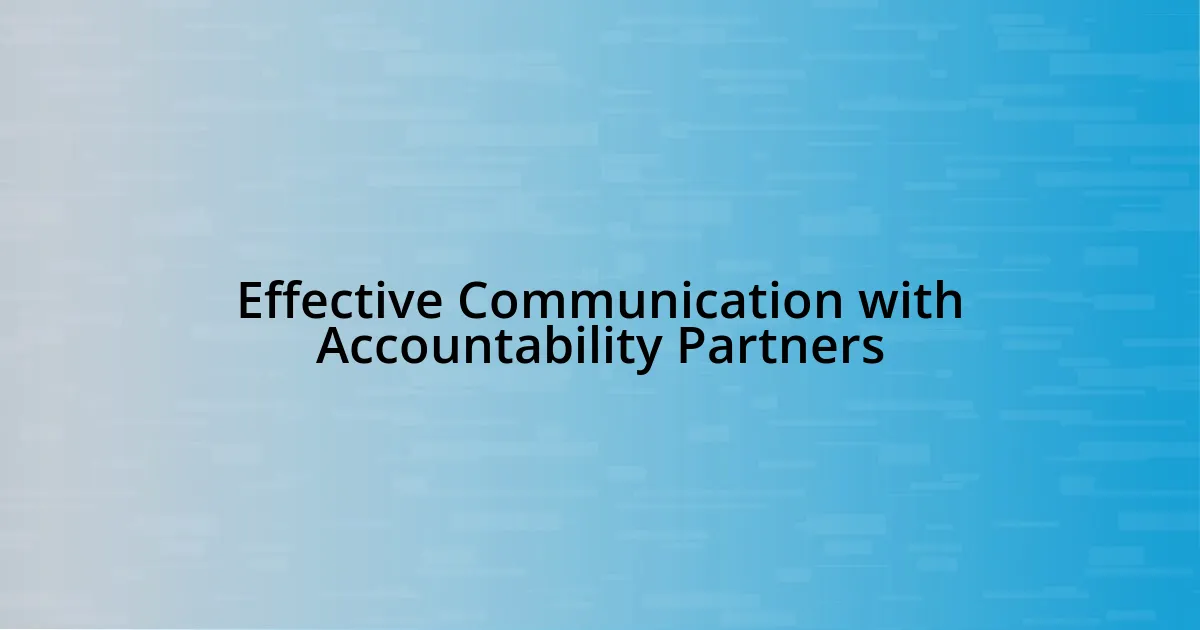
Effective Communication with Accountability Partners
Effective communication with an accountability partner is really the heart of the relationship. I remember a time when my partner and I had differing views on how to tackle a problem. Instead of brushing it off, we dedicated time to openly discuss our perspectives. I found that having those candid conversations not only clarified my own thoughts but also deepened our understanding of each other’s approaches. Doesn’t it feel empowering to express your ideas freely without fear of judgment?
Equally important is the way we check in with one another. I’ve learned that setting a regular schedule for our calls wasn’t just about accountability; it also became a space for emotional support. During one particularly challenging week, I opened up about my feelings of inadequacy. Instead of just focusing on progress, we explored those emotions together, which ultimately renewed my motivation. How do you feel when you know someone genuinely cares about both your successes and struggles?
Lastly, keeping the tone light-hearted occasionally can work wonders. I often added a bit of humor to our check-ins, like making playful comments about our misadventures in goal-setting. This not only made our discussions enjoyable but also helped to ease the pressure of striving for perfection. Aren’t those light moments just as crucial as the serious ones when it comes to sustainable progress? The balance of fun and serious talk paves the way for a more fulfilling partnership.
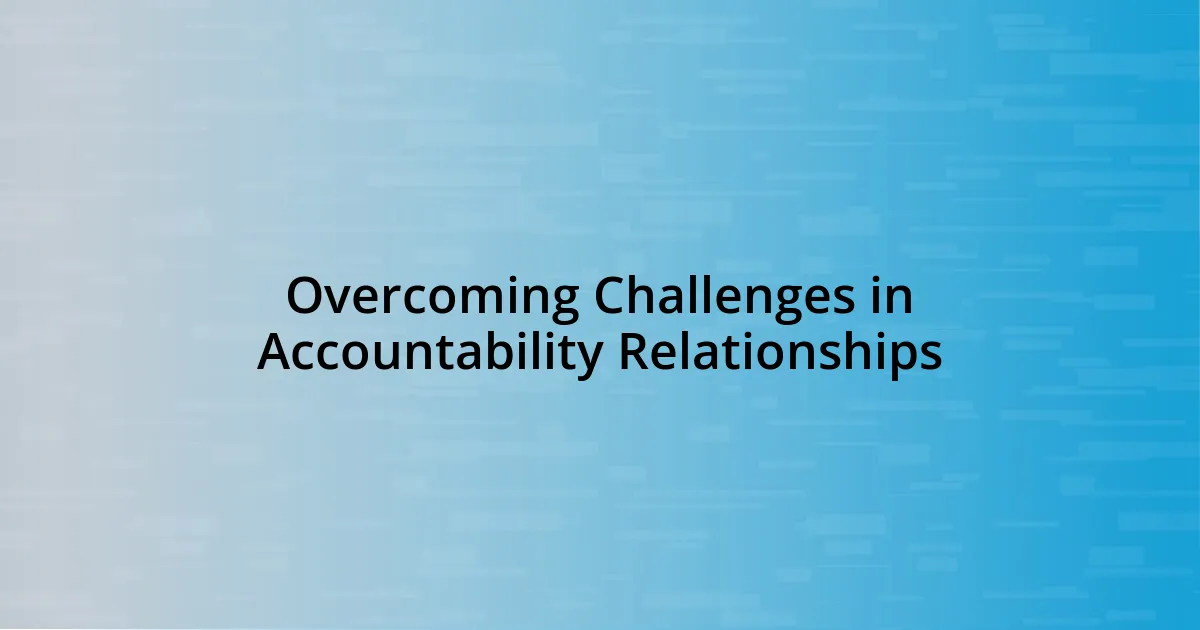
Overcoming Challenges in Accountability Relationships
Overcoming challenges in accountability relationships can be a journey filled with learning. I recall a period when my partner and I hit a rough patch, largely due to unspoken expectations. It was uncomfortable to confront, but eventually, we sat down over coffee and clarified what each of us needed from the partnership. Have you ever had a conversation that felt a bit daunting at first, but ultimately lifted a weight off your shoulders?
Another hurdle we faced was maintaining consistency, especially during busy times. I remember one week when my partner was overwhelmed with work and completely dropped off. Rather than letting it slide, I reached out to check in. It turned out they appreciated that nudge, as it reignited our momentum. I’ve learned that being proactive in addressing these lulls can make all the difference. How often do you think about reaching out to someone before it becomes an issue?
Lastly, vulnerability plays a significant role in overcoming obstacles together. There was a time when I felt embarrassed to admit I had fallen behind on my goals. But when I finally shared my struggles with my partner, we found that opening up created a deeper bond. It’s funny how those awkward moments can lead to stronger connections, don’t you think? With honesty in place, we were able to brainstorm supportive solutions, making the partnership even more resilient.
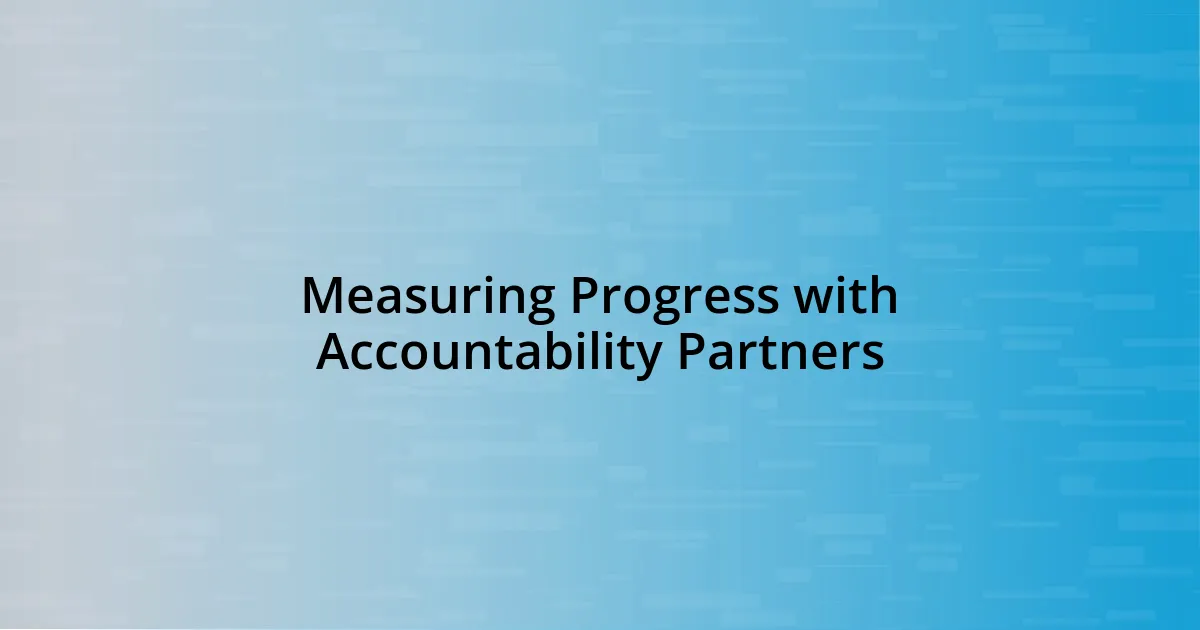
Measuring Progress with Accountability Partners
Measuring progress with accountability partners often hinges on the metrics we choose to evaluate. In my experience, we’d set specific, measurable goals that transcended mere numbers; for instance, I wouldn’t just aim to write a certain number of words but would focus on the quality and clarity of my writing as well. What I found helpful was sharing these qualitative aspects during our check-ins—it fostered a richer dialogue about growth and kept us motivated.
Another incredible aspect of tracking progress was celebrating small victories together. There was a moment when I finally finished a project I’d been struggling with for weeks. Instead of simply ticking it off my list, I invited my accountability partner to celebrate my achievement. We laughed, shared what we learned, and that moment elevated my sense of accomplishment. How often do we truly recognize our hard work? I believe marking these milestones reinforces our dedication and helps us remain committed to our goals.
Additionally, I discovered that maintaining an open-ended reflection process was invaluable. We’d discuss setbacks as learning opportunities instead of failures, sharing insights on what worked and what didn’t. One day, I shared my frustration over unmet goals, and my partner reminded me that setbacks often lead to deeper understanding. This shift in view not only lightened the emotional load but also provided a clearer perspective on our paths forward. Isn’t it powerful how reframing our approach can spark motivation?









